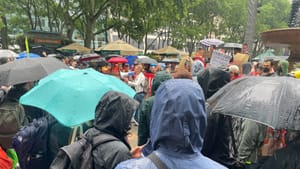Stay in the Loop
BSR publishes on a weekly schedule, with an email newsletter every Wednesday and Thursday morning. There’s no paywall, and subscribing is always free.
Writers and artists lead America’s nonviolent fight for justice.
This Fourth of July, we need a narrative revolution.

I recently shared with my child the story of how I, someone with pacifist ideals, stood up to a bully when I was in middle school. The bully always made lewd and misogynistic comments to me on our bus ride home each day. I complained about him to my mother, who implied “boys will be boys” and advised me to “just ignore him.” So I did, until the day he smacked my head against the school bus window.
What happened next surprised me. After my head rebounded from the glass, I spun toward him, lunged over the bus seat, and punched him repeatedly until the bus driver pulled over and intervened. The bully came out of the altercation with a bloody nose, a bruised ego, and a four-day suspension. We both had to explain ourselves to the school principal, who didn’t suspend me because I was defending myself.
Despite this, I don’t believe that violence is a reasonable answer to injustice. What I hope my child learned from my story is the importance of standing up to bullies and how our strength is found not when we sink to their level (which I admittedly did), but when we use our voices to rise above. Stories resonate. Peers talked about what happened, how I’d unexpectedly stood up to him, which took away his power. Ultimately, it was the story that defeated my bully, who never hurt me again.
Still fighting bullies
Now we have a bully in the White House, and it is imperative that resistance to him remains nonviolent so that Trump continues to look as unreasonable as he is (and because nonviolent resistance is much more effective than the alternative). Consider the powerful visual juxtaposition on the front pages of newspapers worldwide after June 14, when millions of people joined thousands of peaceful “No Kings” protests in all 50 states during Trump’s underwhelming military parade.
Narrative is the way, even though building it is now harder than ever.
Earlier this year, I was hired to write profiles of National Endowment for the Arts (NEA) grant recipients—a job I was counting on. But because this job was partially funded by the NEA, it was “placed on hold” in late February due to Trump’s executive orders targeting Diversity, Equity, and Inclusion (DEI). The coordinator who’d hired me explained via email that her nonprofit organization was “navigating some ambiguity” about how the orders would affect the NEA’s role in the “storytelling” aspect of the job.
Instead of allowing myself to fall deeper into post-election despair because of this lost job, which feels like another sucker punch from the aspiring dictator in the White House, I am determined to pursue solidarity and resistance. I am heartbroken and afraid for everyone who is being targeted by this cruel administration.
The authoritarian playbook
But out of this heartbreak and fear grows a more useful reaction: outrage. Trump’s unconstitutional executive orders, especially those aiming to stamp out cultural diversity, are unacceptable. There is a reason authoritarians aim to shut down and silence artists and writers. It is an attempt to control the narrative and rewrite reality and history.
According to the Trump narrative, DEI initiatives advance incompetent people. We have to fight back with the truth: DEI helps everyone who is qualified, regardless of their identity, get the opportunities and working conditions they deserve. DEI supports qualified people who would have been excluded in the past. Efforts to dismantle it are rooted in white supremacy: the narrative that white, cis, straight, able-bodied men are naturally better than everyone else.
Not only are Trump officials using this narrative to slam the door on people (and funding) who don’t conform to their anti-DEI stance, they are also using it to remove highly qualified, impactful leaders.
For example, Dr. Carla Hayden, the first woman and first African American to lead the Library of Congress, was unjustly fired on May 8, 2025, by the Trump administration. But the Library of Congress staff did not simply roll over and accept this absurd, hateful overreach of executive power. Since the Library of Congress is part of the legislative branch, staff members initially denied entry to Trump’s newly appointed replacements. I admire their courage and example of resistance. It is a moment that gives me a glimpse of how we might collectively stand up to this regime.
Another example to consider is how the Smithsonian, the world’s largest museum complex, originally handled Trump’s executive order that installed JD Vance to oversee efforts to “remove improper ideology” from the institution. Trump announced that he fired Kim Sajet, the first woman to serve as director of the National Portrait Gallery, for being “highly partisan and a strong supporter of DEI.” In response, the Smithsonian issued a statement reaffirming its independence. The Washington Post reported that Sajet was still continuing to report to work. Though about a week later, the Smithsonian announced that Sajet was stepping down and had “put the needs of the Institution above her own.”
The power of our words
If Trump’s strategy is to control the narrative, we must support artists, writers, and cultural leaders more than ever, especially those being targeted. Buy their books. Subscribe to their newsletters and attend the theaters and museums showing their work. Support publications like Broad Street Review that pay arts journalists and provide an invaluable space for conversations about the significance of arts and culture.
For my part, while juggling multiple projects and trying to fill in the gap of lost funding, I am still committed to being selective about the kinds of nonprofit organizations I serve as a communications consultant. As a writer who was awarded a grant in 2021 from a state arts agency funded in part by the NEA, I’m invested in fighting back. An untethered freelancer, I hope to take on more writing projects that amplify the work of artists and writers who are being targeted. I see this as part of my civic responsibility.
My creative writing classes offer another avenue for resisting, in which we find inspiration from diverse and socially relevant passages and artworks. Storytellers can collectively expand empathy and critical thinking—the most impactful form of resistance.
And as a parent, I take action through advocacy and communication. Whether my child faces a school bully or an unjust government, they will not be taught to ignore injustice, but to stand up with the power of their words.
Sign up for our newsletter
All of the week's new articles, all in one place. Sign up for the free weekly BSR newsletters, and don't miss a conversation.

 Cass Lewis
Cass Lewis